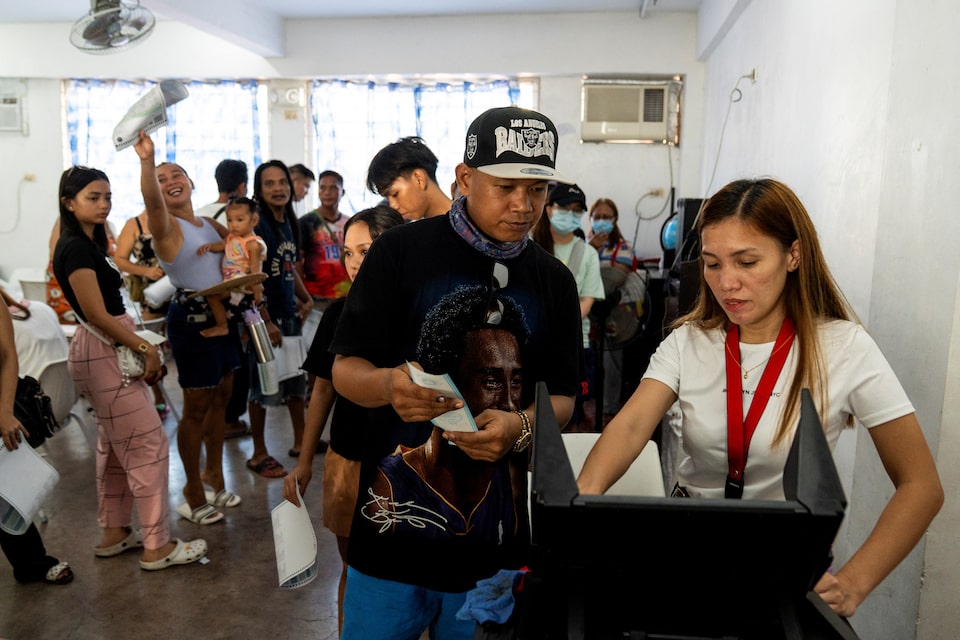A Filipino checks his voter receipt after voting during the midterm elections, at a polling station in Taguig City, Metro Manila, Philippines, May 12, 2025. REUTERS

Filipinos vote during the midterm elections at a polling station in Taguig City, Metro Manila, Philippines, May 12, 2025. REUTERS
Summary
- Senate election key in battle for power
- Sara Duterte fighting for political survival
- Marcos seeks to consolidate power, deliver on policy agenda
- Rodrigo Duterte ICC case a key campaign issue
MANILA, May 12 (Reuters) – Voting was underway in the Philippines on Monday for a normally low-key midterm election that is showcasing an emotionally charged proxy battle between President Ferdinand Marcos Jr. and ally-turned-foe, Vice President Sara Duterte.
Duterte and Marcos are not on the ballot for more than 18,000 positions but have been campaigning aggressively for their slates of candidates, as their bitter rivalry dominates a contest that could influence the future dynamic of power in the country of 110 million people.
At stake for Marcos is his policy agenda, his legacy and influence over his succession in 2028, while Duterte’s political survival could ride on the vote, with an impeachment trial looming that could kill any future hopes of becoming president and following in the footsteps of father Rodrigo Duterte. While posts for mayors, governors and lower house lawmakers are up for grabs, the tussle for Marcos and Duterte is over a dozen coveted seats in the 24-member Senate, a chamber with sweeping legislative influence and political clout that can shape public opinion and sink presidential ambitions.
Both Marcos and Duterte cast their votes early on Monday in their home towns. Duterte told reporters she had recently spoken with her father, who is detained in The Hague and facing trial at the International Criminal Court over his “war on drugs”.
She said she told him that more than two of his 10 endorsed Senate candidates were likely to win. Among the 10 is the former police chief who oversaw the drugs war, during which thousands were killed.
“This election is more than an informal referendum on the Marcos administration,” said Aries Arugay, a political science professor at the University of the Philippines.
“The Senate race is the key proxy battle … Marcos needs to retain a majority, or supermajority, to push forward his legislative and economic agenda.”
Local media reported that voting, which runs from 5 a.m. to 7 p.m., was generally proceeding as expected, aside from some delays caused by glitches in the vote-counting machines.
ACRIMONIOUS FEUD
The election has a new significance after the collapse of the once formidable alliance between the Marcos and Duterte dynasties and the dramatic fall from grace of the popular Duterte family, which has accused the president of orchestrating a campaign to destroy the biggest challengers to his power.
What began as a united front that swept the 2022 election unravelled into an acrimonious feud, marked by a torrent of personal accusations and a bid to impeach Duterte on allegations she misused funds, amassed unexplained wealth and threatened the lives of the president, first lady and the house speaker.
The Senate race is critical, with its members to become jurors if an impeachment trial goes ahead, where Duterte faces removal from office and a lifetime ban. At least 16 votes – a two-thirds majority – are needed to convict her.
“Whatever happens with the impeachment, whether a guilty (verdict) or acquittal, I’m ready for whatever happens,” Duterte said after casting her vote.
Fuelling the flames of an already charged race was Rodrigo Duterte’s arrest by Philippine police in March at the request of the ICC. Sara Duterte has accused Marcos of selling out sovereignty in giving up a former president to a foreign court.
Despite his detention, Duterte is on Monday’s ballot for mayor in his hometown.
Both Dutertes have denied wrongdoing and have challenged the cases against them.
Marcos has distanced himself from the impeachment and rejects allegations of a vendetta against the Duterte family.
He has touted economic gains and his defence of sovereignty, campaigning on his tough stand against Beijing’s conduct in the South China Sea, with China emerging as a political lightning rod in the election.
Reporting by Karen Lema and Devjyot Ghoshal; Editing by Martin Petty and John Mair





